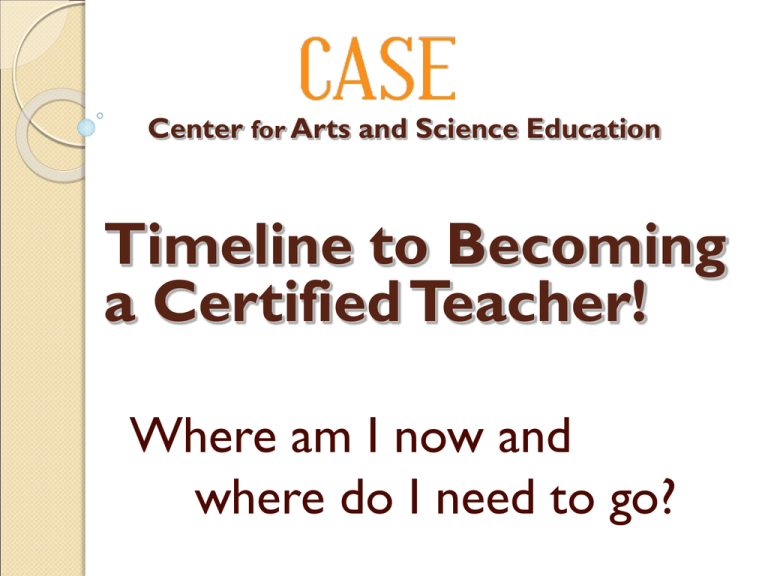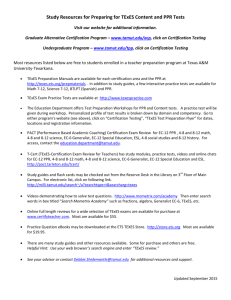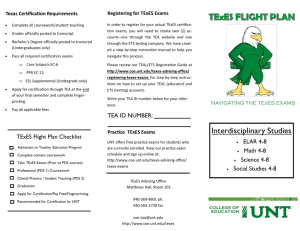Timeline Certification Testing
advertisement

Center for Arts and Science Education Timeline to Becoming a Certified Teacher! Where am I now and where do I need to go? CASE Staff www.academics.utep.edu David Vasquez – College of Liberal Arts Teacher Preparation ◦747-5290 ◦vasdavid@utep.edu Ana Lee Covey - College of Science Teacher Preparation ◦747-5032 ◦acovey@utep.edu Ellen Esposito - College of Science Teacher Preparation ◦747-8468 ◦edesposito@utep.edu Dr. Michele Levy - Student Teaching and Induction ◦747-5025 ◦mslevy@utep.edu Dr. Amanda DeGraff - Student Data and Testing ◦747-8884 ◦adegraff@utep.edu Objectives for Today: Prepare you for what to expect as you move towards graduation and certification Answer any questions you may have about testing, student teaching, graduation, and certification To Get Hired as a Teacher: Take and pass UTEP required Content and PPR (Pedagogy and Professional Responsibility) Qualifying exams. Take and pass Content and PPR TExES certification exams Graduate from UTEP Register and pay for your teaching license Pass a background check Timeline to Graduation Applications to Teacher Education In order to be accepted to the Teacher Education Program you must: Have a ‘C’ or better in: English 1311, 1312 Communication 1301/1302 Math 1319 or higher Pass the TASP or THEA with: 230 on the Math 220 on the Writing 250 on the Reading Complete 60 hours with a GPA of 2.5 or better May 2010 May 2010 Sunday Monday Tuesday Wednesday Thursday Friday Saturday APRIL 30 1 End of Internship 2 3 4 5 6 7 8 9 10 11 12 13 14 15 16 17 18 19 20 21 22 23 24 25 26 27 28 29 30 Your Goal: Complete all exams and have a teaching contract by Graduation! 31 Qualifying Exams In order to graduate you MUST receive a 78% on both of your qualifying exams 1 content exam – 2.5 hours long (science 5 hrs) 1 PPR exam – 2.5 hours long You can begin taking your qualifying exams as soon as you have been admitted to teacher education You MUST pass BOTH of the qualifying exams: to receive a grade for student teaching to graduate UTEP Content qualifying exams Content first You’ve learned a majority of this material in your freshman, sophomore and junior level courses Prepare as if for the MCAT or GRE – lots of study time! Complete 6 documented hours of review offered by your college or at library Timeline is important! UTEP PPR qualifying exams Pedagogy and Professional Responsibilities The majority of this material is covered by your education courses Prepare as if for the MCAT or GRE – lots of study time! Complete 6 documented hours of review Timeline is important! January 2010 Sunday Monday January 2010 Tuesday Wednesday Thursday Friday 1 3 4 5 6 11 2 7 8 Deadline Paper- 9 Contact College based TExES to clear for Content or PPR graduation test ISD orientations Form a study group 10 Saturday 12 13 14 15 16 19 20 21 22 23 29 30 Most internships begin 17 18 Content review 24 25 26 27 28 Content review 31 February 2010 February 2010 Sunday Monday 1 Tuesday 2 3 Content 7 8 9 15 16 21 22 23 28 Saturday 4 5 6 11 12 13 Take Content Qualifying 18 19 20 Register TExES computerbased content TExES computer based content exam Review 24 PPR Friday Review 17 Content Thursday Review 10 Content 14 Wednesday 25 Review 26 Paper-based TExES Content or PPR 27 March 2010 Sunday Monday 1 March 2010 Tuesday 2 Wednesday 3 PPR 7 8 9 Thursday 4 Friday Saturday 5 6 12 13 Review 10 11 Receive TExES score report PPR 14 15 16 Review 17 Register TExES computer- based TEXES PPR PPR 18 UTEP PPR qualifying exam 19 Deadline to register for TExES PPR or Content 20 26 27 TExES PPR Review 21 22 23 24 28 29 30 31 25 April 2010 Sunday Monday April 2010 Tuesday Wednesday Thursday 1 Friday Saturday 2 3 4 5 6 7 8 9 10 11 12 13 14 15 16 17 Paper-based TExES PPR or Content Exam Give feedback on teacher education program thru’ Survey Monkey 18 19 20 21 25 26 27 28 Pass all exams by this date! UTEP Teacher Job Fair 22 23 29 30 End of Internship 24 May 2010 May 2010 Sunday Monday Tuesday Wednesday Thursday Friday Saturday 1 2 3 4 5 6 7 8 9 10 11 12 13 14 15 16 17 18 19 20 21 22 25 26 27 28 29 TExES paperbased test results 23 24 30 31 How To Begin? Gather your resources and study them before content reviews! Preparation Handbooks ◦ http://texes.ets.org/texes/prepMaterials/ Registration Bulletin ◦ http://www.texes.ets.org/registrationBulletin/ Know how the test is scored p. 38 Registration Bulletin http://www.texes.ets.org/registrationBulletin/ Qualifying Exams - Studying You must have 6 hours of review prior to every qualifying exam you take. ◦ You should have much MORE than 6 hours. ◦ Study for these exams like you would for your SAT or a final exam. Review hours must be documented with proof Qualifying Exams – Review Hours Review schedule is on CASE website ◦ http://academics.utep.edu/case Review hours can be conducted at: ◦ ◦ ◦ ◦ Library College of Education Ellen Esposito’s office (Math and Science) Dr. Keith Ereckson’s office (History and Social Studies) You can also attend content and PPR review sessions Science – ◦ You must take a 5 hour qualifying exam Qualifying Exams - Registration Registration for Content or PPR qualifying exams will ONLY be available 2 business days prior to the exam date. ◦ FOR EXAMPLE: Test date March 7, 2009. Registration begins on March 5, 2009 @ 7:00 am. Register at http://testing.utep.edu ◦ in person at the Student Assessment & Testing Office (located in the Academic Advising Center Bldg, Suite 127) ◦ call the TEST RESERVATION line at (915) 747-5009. (Required for science) Qualifying exam – misc. Instant results Come prepared ◦ Proof of 6 hours of review ◦ Jacket ◦ Water/snack (leave in locker) Math – own calculator ◦ New batteries! ◦ Know how to clear the memory! Certification Exams You can begin taking your certification exams as soon as you have passed appropriate qualifying exam and have been admitted to Teacher Education ◦ This means that if you set your timeline correctly, you should pass both of your certification exams before you graduate Many tests are computer based and offered almost every week. Some are offered only three times a year!!! Certification Exams Offered Via Computer for 2009-2010 •English as a Second Language Supplemental •Health EC–12 •History 8–12 •Life Science 8-12 •Mathematics 8–12 •Music EC–12 •Pedagogy and Professional Responsibilities EC–12 •Pedagogy and Professional Responsibilities 8–12 •Physical Education EC–12 •Science 8–12 TExES Paper Testing Dates TExES Registration Once you have passed, you will be cleared to take the appropriate state certification exam. Step 1: OBTAIN YOUR TEA ID NUMBER The TEA ID number is used to register for your state certification exam. ◦ Go to www.sbec.state.tx.us. Look for the section that reads Educator Login and click on “NEW USER?” ◦ Supply all the necessary information to complete your educator profile including up- to-date e-mail and telephone contact numbers then proceed to Step 2. TExES Registration Step 2: REGISTER FOR YOUR STATE CERTIFICATION EXAM ◦ You have two registration options: ONLINE REGISTRATION: Go to www.texes.ets.org. Follow on-screen instructions and register for the exam you are eligible to take. TELEPHONE REGISTRATION: Call 1-866-9025922 to register for eligible exams. Certification Exams To become certified you must receive a score of at least 240 on your state content exam and state PPR exam. These exams are each 5 hours long These exams cost $120 per exam ◦ 1 Content + 1 PPR = $240 ◦ Every time you fail you must spend another $120 ◦ $35 Late registration fee (paper-based tests); $75 Emergency registration fee (paper-based tests) Studying for all 4 of your Exams The qualifying exam is practice for your certification exam. ◦ The time you spend studying for them helps prepare you for your certification exams. Consider using the following study materials: ◦ ◦ ◦ ◦ ◦ ETC test preparation handbooks Cliff notes Laminated Reference Guides TAKS tests State end of course exams Study Groups Consider forming a study group ◦ Create your own group, one will not appear from nowhere. ◦ Find other interested students: Ask classmates you know and those you don’t Announce the formation of a group at the start of class Talk to your professors Create Study Group Ground Rules Be on time, respectful of others, cell phones, etc. Be prepared Have homework, preparation handbooks, calculators Have questions about the subject ready to discuss Bring class notes and textbooks that will help with the session Have regular meetings – weekly, bi-weekly, monthly based on your timeline. This is a study group, NOT a social group Short term sacrifice for long term gain Student Teaching You will apply for student teaching the semester before you intend to be a student teacher Dr. Michele Levy does the placements for Secondary and All-Levels Before you can be placed you must be admitted to the Teacher Education Program Student Teaching Attend student teaching orientations ◦ CASE - Secondary ◦ College of Education ◦ School District Student teaching is a FULL-TIME position ◦ Plan ahead ◦ From 8 am – 4 (or 5) pm you cannot work or take other classes. University Career Services Craig Thompson – Associate Director ◦ Your contact for teaching jobs locally and across the country Job Mine ◦ Complete your job mine account so we can better serve you You will need references and a resume!




